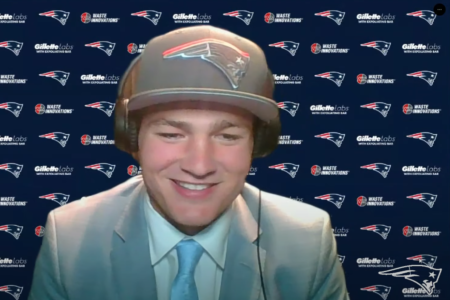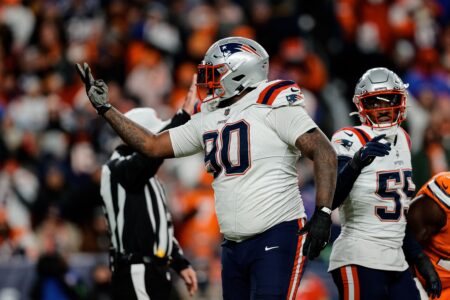- Joined
- Sep 7, 2006
- Messages
- 68,321
- Reaction score
- 105,257
Step 1: you have to draft a prospect in order for him to succeed or fail.
Step 2: you have to draft the prospects with the best chance of succeeding in your system.
Step 3: it's not a perfect process, so you have to draft more than one of them until you have an adequate pipeline.
BB has failed at all 3 steps. He hasn't even drafted enough OLB candidates to establish a pipeline, much less picked ones with high chances of succeeding.
Here's the potential 3-4 DE/OLB candidates I can think of in the BB era who were drafted between rounds 1 and 5 and who had anything near the kind of measurables that BB claims to look for:
2000: LaVar Arrington (1-3), John Abraham (1-13), Julian Peterson (1-16), Keith Bullock (1-30), John Engelberger (2-35), Clark Haggans (5-137), Kabeer Gbaja-Biamila (5-149)
2001: Andre Carter (1-7), Aaron Schobel (2-46), Derrick Burgess (3-63), Carlos Polk (4-112)
2002: Julius Peppers (1-2), Napoleon Harris (1-23), Kalimba Edwards (2-35), Akin Ayodele (3-89), Dennis Johnson (3-98), Alex Brown (4-104), Aaron Kampman (5-156)
2003: Terrell Suggs (1-10), Calvin Pace (1-18), Chris Kelsay (2-48), Antwan Peek (3-57), Robert Mathis (5-138)
2004: Jason Babin (1-27), Karlos Dansby (2-33), Shaun Phillips (4-98), Jared Allen (4-126)
2005: DeMarcus Ware (1-11), Shawne Merriman (1-12), David Pollack (1-17)
2006: AJ Hawk (1-5), Chad Greenway (1-17), Bobby Carpenter (1-18), Manny Lawson (1-22), Mathias Kiwanuka (1-32), Chris Gocong (3-71), Elvis Dumervil (4-126), Ray Edwards (4-127), Rob Ninkovich (5-135), Mark Anderson (5-159)
2007: Gaines Adams (1-4), Jarvis Moss (1-17), Anthony Spencer (1-26), LaMarr Woodley (2-46), Quentin Moses (3-65), Stewart Bradley (3-87), Brian Robison (4-102), Zak DeOssie (4-116), Antwan Barnes (4-134)
2008: Chris Long (1-2), Vernon Gholston (1-6), Lawrence Jackson (1-28), Quentin Groves (2-52), Shawn Crable (3-78), Bruce Davis (3-88), Cliff Avril (3-92), William Hayes (4-103)
2009: Aaron Curry (1-4), Aaron Maybin (1-11), Brian Orapko (1-12), Brian Cushing (1-15), Larry English (1-16), Robert Ayers (1-18), Clay Matthews (1-26), Everette Brown (2-43), Clint Sintim (2-45), Connor Barwin (2-46), David Veikune (2-52), Paul Kruger (2-57), Cody Brown (2-63), Matt Shaughnessy (3-71), Lawrence Sidbury (4-125)
That's 72 prospects between round 1 and 5 over a 9 year period, for an average of 8 per year. The number of potential prospects has been dramatically increasing over recent years, when our need has been greater. During that period we took exactly 1 of those guys, Shawn Crable at #78 in the 3rd round in 2008.
I count 21 potential DE/OLB conversion prospects who grade out between the 1st and 5th rounds for 2010. But it's hard to win the game if we don't even play. We're not even getting to step 1 in the OLB pipeline process.
Thats most likely one of the best posts that I have ever read. Great research.
What all this tells me is one thing. Clearly, the team needs to recalibrate how is grades out OLBs so they can produce for this team. Perhaps alter thedefensive system so that weakness such as coverage ability and how that skill is projected is weighed less and the ability to put a rush on the QB is weighed higher.
















